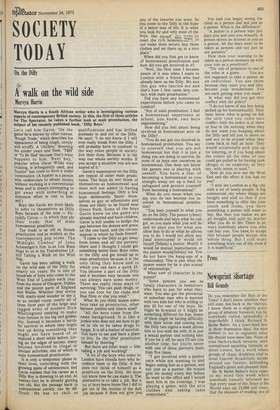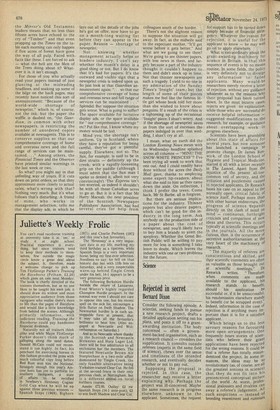Newsprint - shortage
Bill Grundy
Do you remember the Men of the Trees? I don't know whether they still exist, but back in the 'thirties. I knew them as a slightly potty group of amateur foresters, run by somebody called, splendidly if improbably, I think, Richard St Barbe Baker. As a town-bred boy in those depression days, the men seemed to me to represent what life should have been like. None of your back-to-back terraces, with unemployed squatting listlessly at street corners, but a world where groups of chaps, doubtless clad in stout Lincoln broadcloth, strode around our forests, defending England's green and pleasant land. Mr St Barbe Baker's boys came to my mind this week when somebody casually informed me that every issue of the News of the World eats up 15,000 tall trees, that the pleasure of reading one of the Mirror's Old Testament leaders means that no less than fifteen acres have echoed to the cry of "Timber!" and that even propping up the Times on the table each morning can only happen if five acres of forest have gone the way of all pulp. Faced withfacts like these. I am forced to ask — what the hell are the Men of the Trees doing about it? Whatever it is. it isn't enough.
For those of you who actually read your papers instead of just glancing at the misleading headlines, and soaking up some of the bilge on the back pages, may recently have, noticed this sort of announcement: "Because of the
world-wide shortage of newsprint," which is, of course. not the ink, but the paper the waffle is daubed on, "the Guardian, in common with other newspapers, is restricting the number of unordered copies available at newsagents. This is to conserve supplies so that our comprehensive coverage of home and overseas news and the full range of services can be maintained...." Among others, the Financial Times and the Observer have printed similar warnings in the last week or two.
So what? you might say in that unfeeling way of yours. If it cuts down on print orders, so that they approximate more closely to actual sales, what's wrong with that? Nothing very much. But it's what follows that's disturbing. A friend of mine, who works in management selection, tells me that the display ads, in which he lays out all the details of the jobs he's got on offer, now have to go on a month-long waiting list before they can appear in the paper. Reason — shortage of newsprint.
• Not knowing whether management actually helps or hinders industry, I can't say whether the month's delay is a good thing or not. But I do know that it's bad for papers. It's the outward and visible sign that a newsprint crisis is indeed upon us. So just look at that Guardian announcement again: "... so that our comprehensive coverage of home and overseas news and full range of services can be maintained . . ." Splendid. But suppose the situation gets worse. What is going to suffer? The space available for lucrative display ads, or the space available for "our comprehensive coverage" etc? Put like that. I know where my money would be laid.
Mind you, the shortage isn't uniform. Up in Scotland, where they have a reputation for being careful, they've got a plentiful supply. Elsewhere, not so. The Sun, for example, is said to be in dire straits — definitely up the creek, with a rapidly-loosening grip on the paddle (although I must admit that the Sun man I spoke to denied it, albeit not very convincingly). The Express isn't too worried, as indeed it shouldn't be with all those Canadian acres to go at. But it is a fact that Mr Harry Macnab, the next president of the Scottish Newspaper Publishers' Association, has had several cries for help from
colleagues south of the border.
There's not the slightest reason to suppose the situation will go away. In fact, as the midwife said to the expectant mother, "It'll get worse before it gets better." And what are we going to see then? We're going to see thinner papers, with less news in them, and largely because a part of the industry thought it couldn't happen to them and didn't stock up in time. Not that thinner newspapers are such a tragedy. I yield to no one in my admiration of the Sunday Times's 'Insight' team: but the length of some of their pieces makes me feel like the famous little girl whose book told her more than she wished to know about penguins. If a result of the crisis is a tightening up of the occasional 'Insight' piece, I shan't worry. And if the shortage of newsprint saves us from the sort of excesses the papers indulged in over that wedding, I shan't cry at all.
I mean, what on earth did the London Evening News mean with its Wednesday headline splashed across all columns — "MINE! THE SNOW-WHITE PRINCESS"? I've been trying all week to work that one out. And I could readily have done without the acres the Daily Mai/ gave. thanks to employing some expert lip-readers, about what she said to him as they came down the aisle. On reflection, 'I think I prefer the trees. Come back, Mr St Barbe, all is forgiven..
But there are serious implications for the industry. Thinner papers but also dearer papers, which can't be good for the industry in the long term. Ask anybody on the production side of a paper about the cost of newsprint, and you'll likely have to buy him a brandy to avert the apoplexy. Whether the Great British Public will be willing to pay more for less is something I take leave to doubt. Which leaves the industry with one or two problems for the future.



































 Previous page
Previous page